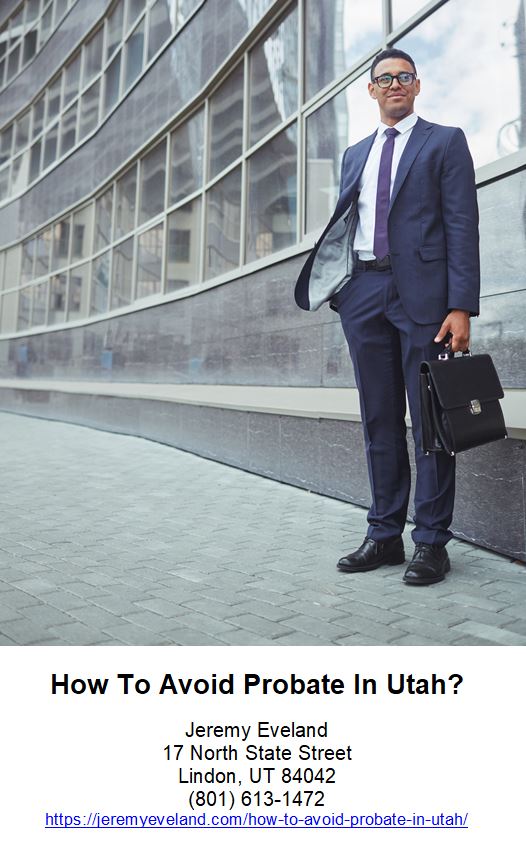Informal Probate is a streamlined legal process that provides an efficient and cost-effective solution for settling an estate. It offers individuals the opportunity to navigate the probate process with ease, without the need for complex court procedures. With Informal Probate, you can resolve estate matters promptly and smoothly, ensuring that the assets are distributed according to the wishes of the deceased. This article aims to provide you with an overview of Informal Probate and demonstrate how our experienced attorney can guide you through this process, allowing you to focus on what truly matters during this difficult time.

What is Informal Probate?
Informal probate is a legal process used for the administration of a deceased person’s estate. It provides a simpler and more efficient alternative to formal probate proceedings, allowing for a quicker resolution of the estate’s affairs. Unlike formal probate, which involves court hearings and extensive oversight, informal probate enables the personal representative, also known as the executor, to manage the estate with less court supervision.
Definition of Informal Probate
Informal probate is a streamlined process that allows for the efficient administration of an estate without the need for formal court hearings. It provides a more flexible and less time-consuming approach to handling the distribution of assets, payment of debts, and resolution of any disputes that may arise. This type of probate is governed by state laws and regulations, which vary depending on the jurisdiction.
When is Informal Probate Used?
Informal probate is often used when the estate is relatively small or straightforward, and there is no anticipation of disputes or complications. It can also be the preferred option when the decedent had a valid and uncontested will in place. The specific criteria for eligibility for informal probate vary by state, but generally, the estate must not involve complex issues, such as disputes among heirs or significant debts.
Advantages of Informal Probate
Less costly than formal probate
One of the main advantages of informal probate is its cost-effectiveness. Since the process is less formal and requires fewer court hearings, the fees associated with attorney representation and court filing are generally lower. This can be a significant advantage for the estate, as it allows for a greater portion of the assets to be distributed to the beneficiaries rather than being consumed by probate expenses.
Quicker process
Compared to formal probate, which can often be lengthy and time-consuming, informal probate typically offers a faster resolution. Without the need for extensive court oversight and hearings, the personal representative can carry out the necessary tasks more efficiently, expediting the distribution of assets to the beneficiaries. This can help ease the burden on the estate’s beneficiaries, who may be in need of their inheritance for various purposes.
Less court supervision
Informal probate provides more autonomy and flexibility to the personal representative in managing the estate’s affairs. Since the court’s involvement is minimal, there are fewer bureaucratic hurdles to overcome. This allows for a more streamlined administration process, enabling the personal representative to make decisions promptly and efficiently to settle the estate.

Requirements for Initiation
Petition for Informal Probate
To initiate informal probate, a petition must be filed with the appropriate court. The petition typically includes basic information about the deceased individual, such as their name, date of death, and last known address. It may also include the proposed personal representative and a request for informal probate.
Verification of Will
If there is a will, it must be submitted to the court along with the petition. The court will review the will to ensure its validity and authenticity. If the will is found to be valid, the court will proceed with informal probate based on the instructions outlined in the will.
Notice to Interested Parties
After the petition for informal probate is filed, notice must be provided to all interested parties, including heirs, beneficiaries, and creditors. This serves to inform them of the probate proceedings and gives them an opportunity to contest the will or make any claims against the estate. Proper notice is crucial to ensure that all parties have the chance to participate in the probate process.
Discovery Phase
Gathering and Inventorying Assets
During the discovery phase of informal probate, the personal representative is responsible for identifying and collecting all of the decedent’s assets. This includes real estate, bank accounts, investments, personal property, and any other assets of value. Accurate and thorough asset identification is essential to ensure that all assets are properly accounted for and eventually distributed to the beneficiaries.
Valuation of Assets
Once all the assets have been identified, they need to be properly valued. The personal representative may need to engage professionals, such as appraisers or accountants, to determine the fair market value of certain assets. Valuation is essential for calculating estate taxes, paying off debts, and determining the distribution of assets.
Payment of Debts and Taxes
During informal probate, the personal representative is responsible for paying off any outstanding debts or taxes owed by the estate. This includes any mortgage or loan balances, credit card debt, medical bills, and other outstanding obligations. It is crucial to ensure that all debts are properly addressed before proceeding with the distribution of assets to the beneficiaries.
Distribution of Assets
Identification of Heirs and Beneficiaries
Before the assets can be distributed, the personal representative must identify all the heirs and beneficiaries entitled to receive a share of the estate. This may involve conducting genealogical research, reviewing the decedent’s will, or consulting with family members or legal professionals. Clear identification of the heirs and beneficiaries is vital to ensure a fair and accurate distribution of assets.
Distribution Plan
Once the heirs and beneficiaries have been identified, the personal representative must develop a distribution plan. This plan outlines how the assets will be distributed in accordance with the decedent’s wishes as expressed in the will or, in the absence of a will, in accordance with state intestacy laws. The distribution plan should be fair, transparent, and consistent with applicable legal requirements.
Transfer of Property Titles
To finalize the distribution of assets, the personal representative must facilitate the transfer of property titles to the designated beneficiaries. This may involve filing necessary paperwork, such as deeds or transfer certificates, with the appropriate government agencies. Proper documentation and adherence to legal procedures are crucial to ensure a smooth transfer of property titles.
Closing the Estate
Final Accounting
Closing the estate requires the personal representative to prepare a final accounting of all financial transactions related to the administration of the estate. This accounting should include a detailed report of all income, expenses, and distributions made during the probate process. Accuracy and transparency in the final accounting are essential to demonstrate the personal representative’s diligent management of the estate.
Approval by the Court
Once the final accounting is prepared, it must be submitted to the court for review and approval. The court will carefully examine the accounting to ensure compliance with applicable laws and regulations. If everything is in order, the court will issue an order approving the final accounting and authorizing the distribution of the remaining assets.
Distribution of Final Assets
After obtaining the court’s approval, the personal representative can proceed with the distribution of the final assets to the heirs and beneficiaries. This may involve transferring funds, delivering personal property, or facilitating the transfer of ownership of real estate. The personal representative must ensure that all assets are distributed in accordance with the court’s order and the terms of the will, if applicable.

Challenges and Contests
Will Contests
Informal probate is not immune to challenges and contests. One potential issue that may arise is a will contest, where a party disputes the validity or authenticity of the decedent’s will. Will contests can prolong the probate process and lead to increased costs. It is essential to have legal representation to navigate these challenges and protect the interests of the estate and its beneficiaries.
Creditor Claims
Another challenge that can arise during informal probate is creditor claims. Creditors may come forward with outstanding debts owed by the estate, which must be adequately addressed and paid off. Failing to address creditor claims properly can result in legal disputes and potential liability for the personal representative.
Disputes Among Heirs
Disputes among heirs can also complicate the informal probate process. Conflicts may arise regarding the distribution of assets or the interpretation of the decedent’s wishes as expressed in the will. Legal representation can help navigate these disputes, provide mediation, and work towards a fair resolution that preserves the integrity of the estate administration.
Executor’s Duties and Responsibilities
Fiduciary Duty
The executor, or personal representative, has a fiduciary duty to act in the best interests of the estate and its beneficiaries. This includes managing the estate’s assets prudently, providing accurate accounting, and making decisions that align with the decedent’s wishes. The executor must exercise diligence, loyalty, and transparency throughout the probate process.
Managing Estate Assets
The personal representative is responsible for managing the estate’s assets during informal probate. This includes safeguarding the assets, collecting income or rent from properties, and making prudent financial decisions on behalf of the estate. Managing estate assets requires a careful balance of preserving value and generating income for the beneficiaries.
Paying Debts and Taxes
The executor is tasked with paying off any outstanding debts and taxes owed by the estate. This includes filing tax returns, settling financial obligations promptly, and ensuring compliance with tax laws and regulations. Failing to address debts and taxes adequately can result in legal liabilities for the personal representative and delays in the probate process.
Potential Pitfalls to Avoid
Failure to Follow Proper Procedures
One of the potential pitfalls in the informal probate process is failing to follow the necessary legal procedures and requirements. This can lead to delays, disputes, or even litigation. Hiring an attorney provides the expertise needed to navigate the process and ensures that all necessary steps are taken.
Errors in Asset Valuation
Accurate asset valuation is crucial for proper estate administration and tax calculations. Errors in determining the value of assets can result in incorrect tax payments, uneven distribution of assets, or challenges from beneficiaries. Engaging professionals, such as appraisers or accountants, can help mitigate the risk of valuation errors.
Lack of Communication among Heirs
Effective communication among heirs is essential to prevent misunderstandings, disputes, and delays in the informal probate process. The personal representative should establish clear channels of communication and provide regular updates to ensure that all parties are informed about the progress and status of the estate administration.
Why Hire an Attorney?
Expertise in Probate Laws
Navigating the probate process can be complex, especially for individuals who are not familiar with the legal framework. Hiring an attorney with expertise in probate laws ensures that the estate administration is conducted in compliance with applicable regulations, minimizing the risk of legal challenges and errors.
Guidance through Complex Process
The informal probate process involves various legal, financial, and administrative tasks that may be overwhelming for someone unfamiliar with the intricacies. An attorney can provide guidance, explanations, and support throughout the entire process, ensuring that the personal representative understands their duties and responsibilities.
Mitigation of Legal Challenges
An attorney can help mitigate potential legal challenges that may arise during informal probate. Whether it’s a will contest, creditor claim, or dispute among heirs, legal representation can provide valuable assistance in resolving conflicts, protecting the interests of the estate, and ensuring a fair distribution of assets.
In conclusion, informal probate offers a simplified and cost-effective alternative to formal probate for the administration of estates. With its advantages of lower costs, quicker resolution, and less court supervision, it can be an attractive option for small or straightforward estates. However, it is essential to follow the proper procedures, address potential challenges, and seek legal guidance to ensure a smooth and successful informal probate process. Hiring an attorney with expertise in probate laws can provide the necessary expertise and support to navigate the complexities of the process, minimize risks, and protect the interests of the estate and its beneficiaries.
